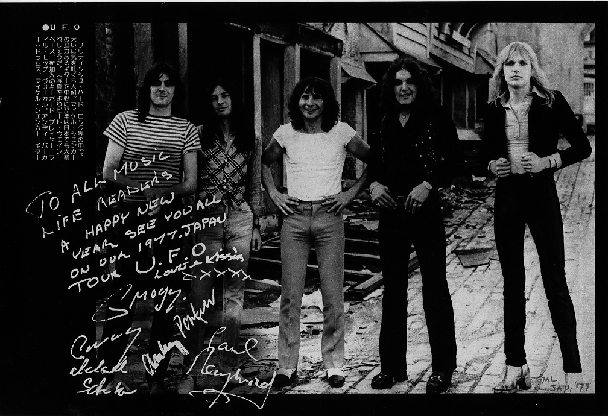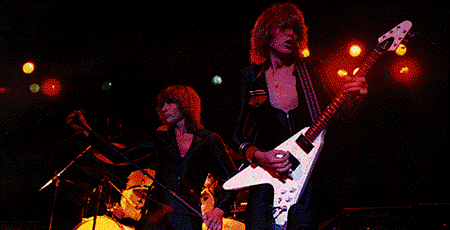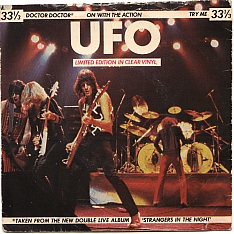

The next album, No Heavy Petting (1976), saw the acquisition of UFO's first full-time keyboardist, Danny Peyronel from Buenos Aires. Some of the songs on the album were very reflective of the 1970s mood. It's the kind of piece that is a good soundtrack when looking over someone's 1976 high school or college yearbook (I was only eight years old then, for that matter). Still, the standard elements were there: the driving heavy rhythms, the shredding guitar solos of Schenker and the sense of energy and spirit in contrast to the more dour Deep Purple and Black Sabbath. The driving rhythms of "Can You Roll Her" and "Reasons Love" were definitely standards for heavy metal playing but tempered in a Me Decade groove. But it was 1976. No Heavy Petting was seen to be a failure commercially and Peyronel was made the scapegoat, subsequently fired. The only standard from the album is "Natural Thing" though in general it was a very fine collection. To me, some of Schenker's best UFO guitar solos of all time are on No Heavy Petting, especially that ascending scalar run on "Reasons Love" and the fiery emotion of "I'm A Loser." I really much prefer the almost raw and loud production of Leo Lyons of this and the previous two records.

The very next album was UFO's magnum opus of the decade, possibly of all time. This magnificent production by Ron Nevison reached no. 22 on the American charts. It was also the first to feature orchestral horns and strings on the classic haunting ballad "Try Me", the near-epic "Love to Love", the Maclean cover of "Along Again Or" and "Just Another Suicide." 1977's Lights Out would also feature the pulsating title cut as one of the top concert anthems. Versatile keyboardist/rhythm guitarist Paul Raymond of Savoy Brown joined them for the project. The line-up of Mogg, Schenker, Way, Raymond and Parker is known as the "classic line-up." Just before the Lights Out tour for the United States, Schenker disappeared (Schenker's lack of English at the time obviated him from directly communicating with the band). Frantically, UFO hauled back Paul Chapman to fill in but the lack of Schenker drastically diminished what was a very crucial time for UFO. If UFO could have been big-time, the Lights Out tour was the opportunity. Eventually, Schenker returned, feeling that a working relationship was pretty much gone. It was the legendary tension between Phil Mogg and Michael Schenker that also was in part the legendary chemistry of the Schenker/Mogg songwriting team, one that is in the same league with Lennon/McCartney.

Typically Schenker was the main music provider for Mogg's clever lyrics. On Obsession (1978), bassist Pete Way provided the bulk of the material. Perhaps, it was at this time that Michael Schenker felt his time with UFO was coming to an end. Like Lights Out, Obsession (again with Nevison behind the board)is also awash in strings and horns to complement some of the semi-ballads. "Only You Can Rock Me" is the standard cut which features an energetic verse and chorus with a classical sounding break. One of Schenker's most intense moments is on the solo to "Born To Lose." "Hot N Ready" is an uptempo rocker that features a great shredding yet melodic solo. The songs on Obsession seem to have a reflective mood. It is much more mature than Force It (which is ironic since Pete Way is known more as a power-rocking riffer than a writer of sweet semi-ballads like "Looking Out for No.1").


By the time 1978 was drawing to a close, UFO recorded the double-live album Strangers In the Night mostly in Chicago. It is regarded as one of the best live albums in rock history by many critics. The live version of "Rock Bottom" has an extended solo by Schenker which in itself was a performance unto itself. Schenker's deftness in working with a mix of pentatonic and Dorian modes before climaxing with Aeolian (working lines with Paul Raymond) is definitely in the top 10 of electric guitar performances of all time, right up there with Van Halen's "Eruption" or Randy Rhoads "Over the Mountain" solo or Yngwie's "Now Your Ships Are Burned." This was to be the last album with Schenker, and of the classic line-up for some time. He gave the band two months notice and departed.
Michael Schenker's mental state reached critical state and badly needed a break. Shortly, he rejoined his brother Rudolph's Scorpions once more before venturing off to form The Michael Schenker Group in 1979. For UFO, the adventure continued, this time with an old guitarist back in the fold as well as a certain producer who worked his magic with Paul McCartney, John Lennon, George Harrison and Ringo Starr.